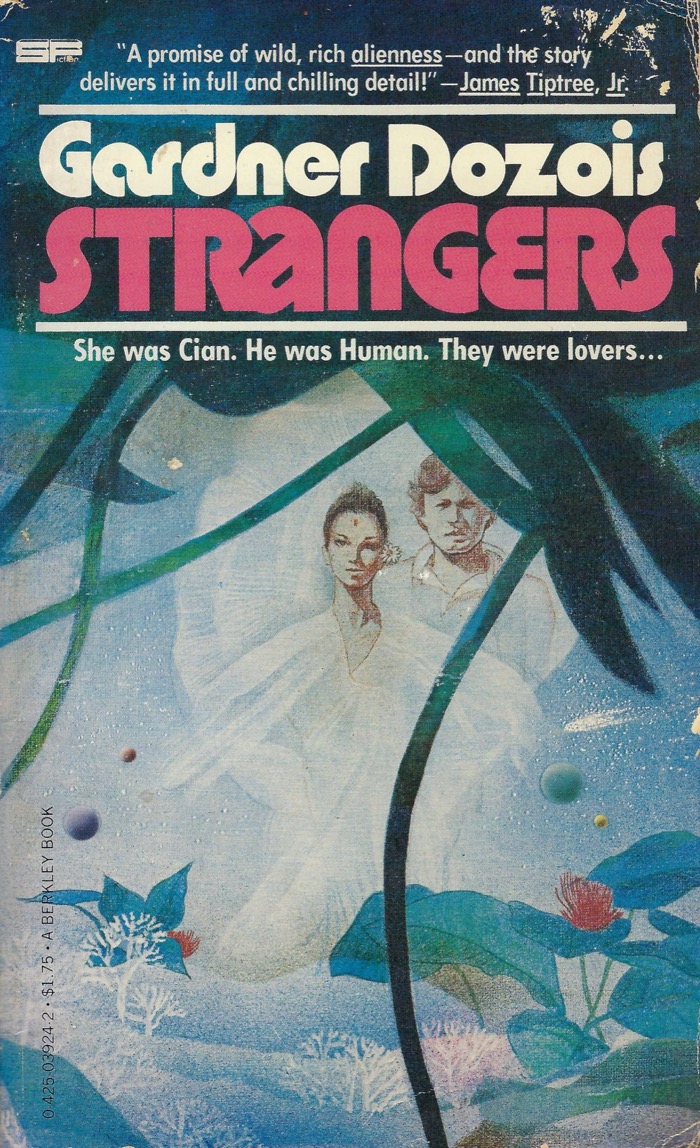Strangers
Reviewed date: 2017 Dec 26
Rating: 1
166 pages
Strangers is the best bad book I've read. Gardner Dozois has written a thoughtful, stylistic, detailed story with meticulously crafted characters and a rich, complex setting. His writing is more than competent, it is excellent. I just didn't like the story. It alternates between vulgar and poetic, neither of which I enjoyed.
Dozois seems at times to be writing from a historian's point of view, commenting on events long after the fact. But at other times, he seems to be an omniscient narrator, with access to Farber's thoughts, feelings, and dreams. I'm not sure what to make of it, but for the most part it works.
Earth is an unimportant player in a vast, busy universe of commerce. Joseph Farber is a member of the Earth trade delegation to the planet Weinunnach. The native Cians are similar in appearance to humans, but their outward similarity obscures the truth: they are thoroughly alien.
Farber, who fancies himself a progressive, enlightened man, starts an affair with a young Cian woman named Liraun. For reasons he imagines to be magnanimous and enlightened, but which are actually self-serving and petty, Farber decides to marry her. The leader of the Terran Co-operative on Weinunnach forbids it, which only goads Farber into carrying through with his plan. The Cian won't permit the marriage either, on the grounds that such a marriage would be infertile. Farber presses the issue, and the Cian agree that the marriage can proceed if Farber has his genes tailored. He will remain outwardly human, but his offspring will be fully Cian.
All this takes roughly half the book, and the story is interlaced with bits of vulgarity and rich poetic imagery. The vulgarity and the poetry are so different that it's jarring to switch between the two.
The remainder of the book builds up to the final revelation. It's agonizing because it's so obvious. It's been clear from the beginning that either Farber or Liraun dies. Then we learn that the Cian men, rather than the women, nurse the babies. Also, the entire Cian society is hiding some big secret. Infertile marriages are unthinkable. Women are chased down and lynched for refusing to become pregnant. There are old Cian men, but no old Cian women. Actually, there are old Cian women, but they are barren spinsters. Pregnant women enter the birthing house, but never leave.
Cian women die in childbirth. Every time. No exceptions. The entire culture is based around this biological reality. Even their religion is built around it. Cian women can voluntarily contracept, but religiously and socially they are required to get pregnant during a birthing cycle which comes every four years. Their husbands decide whether their wives should get pregnant during the first cycle after the marriage, or whether they will wait until the second cycle.
The Cian have possessed for thousands of years the technology to alter their genes and eliminate this deathly biological reality. That they have not done so, and that Cian women willingly accept their fate, is testament to both their alienness as a race, and to the degree with which their culture is centered around this sacrificial death. Somehow, though, the Cian know it's shameful and they hide it from outsiders.
Poor Farber discovers this fact only days before Liraun's due date. He goes to extreme lengths trying to save her. He fails.
It's disappointing that Liraun dies, but it's also, in a way, her own fault. Farber is not a great man, but he does genuinely try. He asks Liraun repeatedly about her thoughts and desires, and particularly whether she wants to get pregnant. Instead of answering plainly, Liraun replies by telling inscrutable lyrical folk tales. Farber literally has no idea what she's trying to communicate, so he makes his best guesses and treats her accordingly.
I don't know if this is supposed to be a book about feminism. Maybe? But in any case I didn't much care for it. It's very well written. Dozois is talented and I've no doubt he hit all the notes he intended. I just didn't like it. That doesn't make it a bad book--to the contrary, it's probably quite a good book--it just makes it a book I didn't like.
